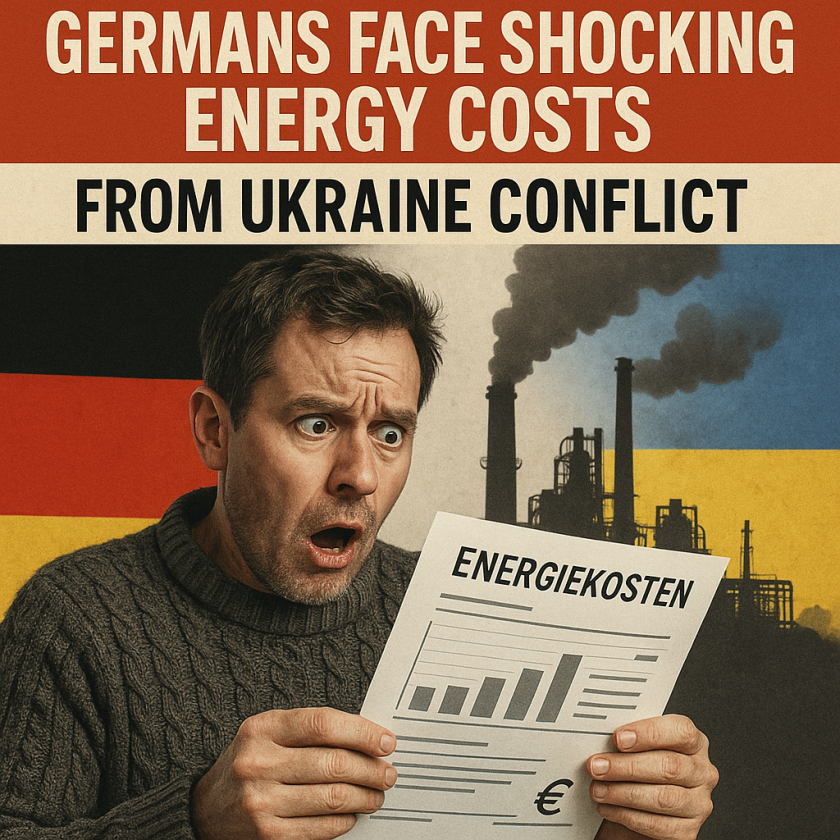Germans Face Shocking Energy Costs from Ukraine Conflict
Germans Face Shocking Energy Costs from Ukraine Conflict
Germans face shocking energy costs as the repercussions of the Ukraine conflict ripple through Europe. This crisis has revealed not only the vulnerabilities in energy supplies but also the broader implications for households and economies across the continent.
The Impact of the Ukraine Conflict on Energy Prices

The ongoing conflict in Ukraine has led to significant disruption in the energy market, particularly affecting Germany—one of Europe’s largest energy consumers. Prior to the conflict, Germany relied heavily on Russian natural gas for its energy needs, which constituted about 55% of its total gas imports. This dependency placed Germany in a precarious position once tensions escalated.
As reported by various sources, including RT and Al Jazeera, the conflict has caused natural gas prices to soar. The European Union (EU) and individual countries have responded with sanctions against Russia, aiming to cut down on energy imports. In particular, the price per megawatt-hour has seen unprecedented increases, directly impacting households and businesses. Recent data indicate that energy bills for the average German household could jump by over 60%, leading many citizens to worry about their ability to afford basic necessities.
Government Responses and Public Sentiment
In light of these soaring costs, the German government has rolled out a series of measures aimed at tackling the energy crisis. Financial aid packages aimed at helping both consumers and businesses have been initiated. However, public sentiment remains mixed. While some appreciate the government’s efforts, others feel they are insufficient and fear long-term economic instability due to the ongoing crisis.
For instance, a survey conducted earlier this month reported a significant percentage of Germans expressing anxiety over the rising costs of living, primarily driven by energy prices. This sentiment reflects a broader concern across Europe as many countries navigate this complex issue. Some analysts suggest that the crisis has catalyzed a much-needed reevaluation of energy policies across the continent, advocating for greater investment in renewable energy sources.
Diverging Perspectives on Energy Policy
While the European Union pushes for a swift transition to renewables, opinions differ on how best to manage the immediate crisis. Some experts call for a temporary return to fossil fuels, particularly coal, to meet urgent needs in the short term. Conversely, advocates for sustainable energy argue that such a move would undermine long-term goals and increase dependency on polluting energy sources.
In response to rising costs, governments are also exploring alternative sources of natural gas, including potential deals with countries like Qatar and the United States. However, these alternatives come with their own set of challenges, including potential sustainability issues and geopolitical ramifications.
In summary, the crisis has opened an opportunity for dialog on energy independence and longevity but has simultaneously intensified existing tensions among EU member states.
Future Prospects and Uncertainties
Looking ahead, the future of energy costs in Germany and Europe remains uncertain. A key question looms: how long will the current energy prices remain elevated? With the Ukraine conflict continuing and sanctions on Russia in place, many experts predict that price volatility may persist.
Furthermore, while the short-term responses may address immediate concerns for many households, the long-term strategy must balance economic viability with sustainability. Some policymakers advocate for increased investment in home energy efficiency to help cushion the blow for consumers.
Ultimately, it’s essential for Germany to chart a path forward that ensures energy security without compromising sustainability goals. As Germany and Europe grapple with the multifaceted challenges posed by the Ukraine conflict, it’s clear that decision-makers must weigh immediate needs against long-term aspirations.
In conclusion, Germans face remarkable challenges stemming from the Ukraine conflict, primarily in the form of shocking energy costs. While the government takes steps to mitigate these impacts, the landscape is complex, and the path ahead is fraught with uncertainties. The ongoing dialogue surrounding energy policy hints at a powerful shift that could redefine Europe’s energy landscape in the coming years.






































